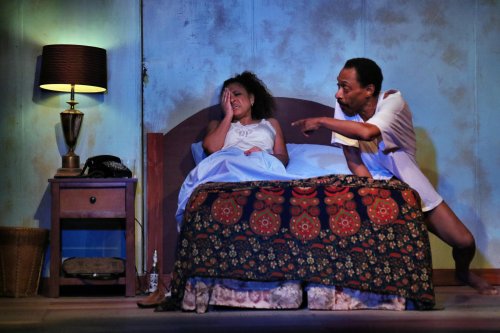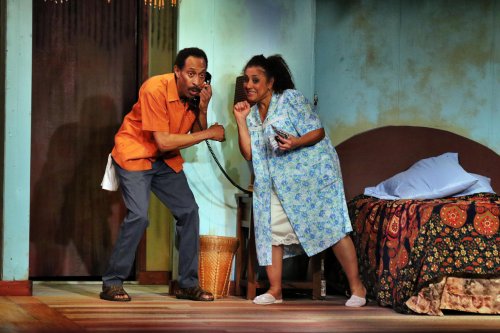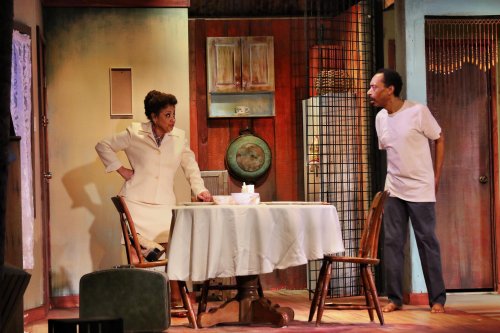Two Can Play
Jamaican dramatist Trevor Rhone’s 1980’s play—about a couple trying to migrate to the U.S.—is worth seeing for Michael Rogers and Joyce Sylvester’s deft acting.

Joyce Sylvester and Michael Rogers in a scene from the New Federal Theatre’s production of “Two Can Play” by Trevor Rhone at the Castillo Theatre (Photo credit: Gerry Goodstein)
[avatar user=”Mark Dundas Wood” size=”96″ align=”left”]Mark Dundas Wood, Critic[/avatar]
Two Can Play, by Jamaican playwright Trevor Rhone (1940-2009), had its New York premiere in 1985, in a production directed by Clinton Turner Davis. Now, Davis has helmed a revival of the show for Woodie King Jr.’s New Federal Theatre, in association with Castillo Theatre.
The play focuses on a middle-aged, lower-middle-class married couple in Kingston in the late 1970’s, who are determined to migrate to the United States. When we first meet Jim (Michael Rogers) and Gloria (Joyce Sylvester), they are having a sleepless night, as the sound of gunfire menaces their neighborhood. No sooner do the violent noises outside subside than they are replaced by the sound of Jim’s father, Pops, coughing on his deathbed in the next room.
In the play’s subsequent scene, Pops is gone, and Jim and Gloria—whose three children have already been smuggled into the U.S.—begin looking seriously for a way to escape their unhappy lives and head north themselves. Eventually they agree on what seems an airtight if time-consuming scheme. The two of them will divorce, then Gloria will travel to the states, where she will pay money to marry another man. Later, she and the man will divorce, leaving her free to remarry Jim and bring him to the states.
Although Jim and Gloria find occasional moments of camaraderie as they work together to make the scheme work, the marriage does not seem particularly happy. The pair are forever squabbling. Jim is a martinet—he actually refers to himself as The General—who shows little respect for his wife’s hard work, intelligence and ingenuity. When she heads off to carry out the scheme, he lapses into a life of squalor, loneliness and near helplessness.

Michael Rogers and Joyce Sylvester in a scene from the New Federal Theatre’s production of “Two Can Play” by Trevor Rhone at the Castillo Theatre (Photo credit: Gerry Goodstein)
Rhone, best known for cowriting the screenplay for the 1972 film The Harder They Come, apparently intended Two Can Play as a comedy. (His Los Angeles Times obituary referred to it as a “farce.”) Certainly, from the outset, Davis, Rogers and Sylvester inject the proceedings with comedic energy. Their characterizations are big and loud, and the fractious dialogue zips along at a rapid, farcical pace.
However, it’s not until the second act that the play generates many laughs. Here, the tables turn on Jim. Gloria, returning to Kingston, has gained self-assurance from her escapades in the states, and she is ready to lay down the law in search of some R-E-S-P-E-C-T from her husband—or, rather, her ex-husband. Interestingly, what she has seen of the U.S. hasn’t impressed her. She doesn’t exactly refuse to follow through with the original plan that she and Jim had hatched, but she doesn’t promise anything. The fact that she is now legally American herself, and no longer Jim’s chattel, has given her both power and initiative. She even begins taking night courses to train as a nurse, so that she can do something more than scrub white Americans’ floors if and when the immigration happens.
“If yuh serious ’bout going to America,” she proclaims, “we going have to remarry, but before we do that, yuh going have to court me again.”
Much of the humor in the second act grows out of that proclamation, and—because some of the satisfaction Gloria has come to expect of Jim is sexual satisfaction—the humor turns fairly ribald in places.

Joyce Sylvester and Michael Rogers in a scene from the New Federal Theatre’s production of “Two Can Play” by Trevor Rhone at the Castillo Theatre (Photo credit: Gerry Goodstein)
The performances here are what makes this revival worth seeing. The actors communicate believably with each other and are thoroughly convincing as longtime spouses who know every move the other will make (until, that is, Gloria begins moving in ways that Jim finds astonishing).
Rogers, known for his roles in—among other things—Shakespearean plays, brings a classical tinge to his role here. His voice booms, and his carriage is that of a man who’s a king in his own mind. At the same time, he gives us subtle glimpses of the hidden devotion that the outwardly selfish Jim feels for Gloria.
The flamboyantly amusing Sylvester is also very fine. Perhaps, though, she is a bit too powerful a presence in Act 1. If she were to seem a bit more diffident at the top of the play, it could create a stronger contrast when we—along with Jim—hear her roar as a strong and invincible woman in the later scenes.
Technical elements are, for the most part, capably attended to. Chris Cumberbatch’s scenic design, depicting the dining room and bedroom of Jim and Gloria’s Kingston house, has (initially, anyway,) a commodious, comfortable look, attesting to Gloria’s homemaking skills in spite of her spouse’s slovenly ways. Lighting designer Antoinette Tynes helps to gives Cumberbatch’s pastels a pleasing aspect.

Michael Rogers and Joyce Sylvester in a scene from the New Federal Theatre’s production of “Two Can Play” by Trevor Rhone at the Castillo Theatre (Photo credit: Gerry Goodstein)
The costumes by Kathy Roberson are right for both the period and the characters. Jim frequently hangs out in his underwear and/or nightshirt, but the clothes for Gloria are more challenging. Early on, the character wears simple housedresses, but as she self-improves—claiming to “deal with life on an international level”—we see her in a business suit with fashionable scarf.
Sound designer Bill Tolles’ work has mixed results. At one point, he creates a highly authentic rainstorm effect that seems to fill the whole theater. However, the sounds of gunfire and Pops’ coughing come off as the recordings they are.
Two Can Play has, arguably, aged better than many other 35-year-old dramatic works. While definitely a “message” play, it doesn’t seem preachy—at least not in this sensitively rendered iteration from Davis, Rogers and Sylvester.
Two Can Play (through March 12, 2020)
Woodie King Jr.’s New Federal Theatre, in association with Castillo Theatre
Castillo Theatre, 543 West 42nd Street, in Manhattan
For tickets, call 212-941-1234 or visit http://www.Castillo.org
Running time: two hours and five minutes including one intermission






Sounds great, looking forward to seeing it!